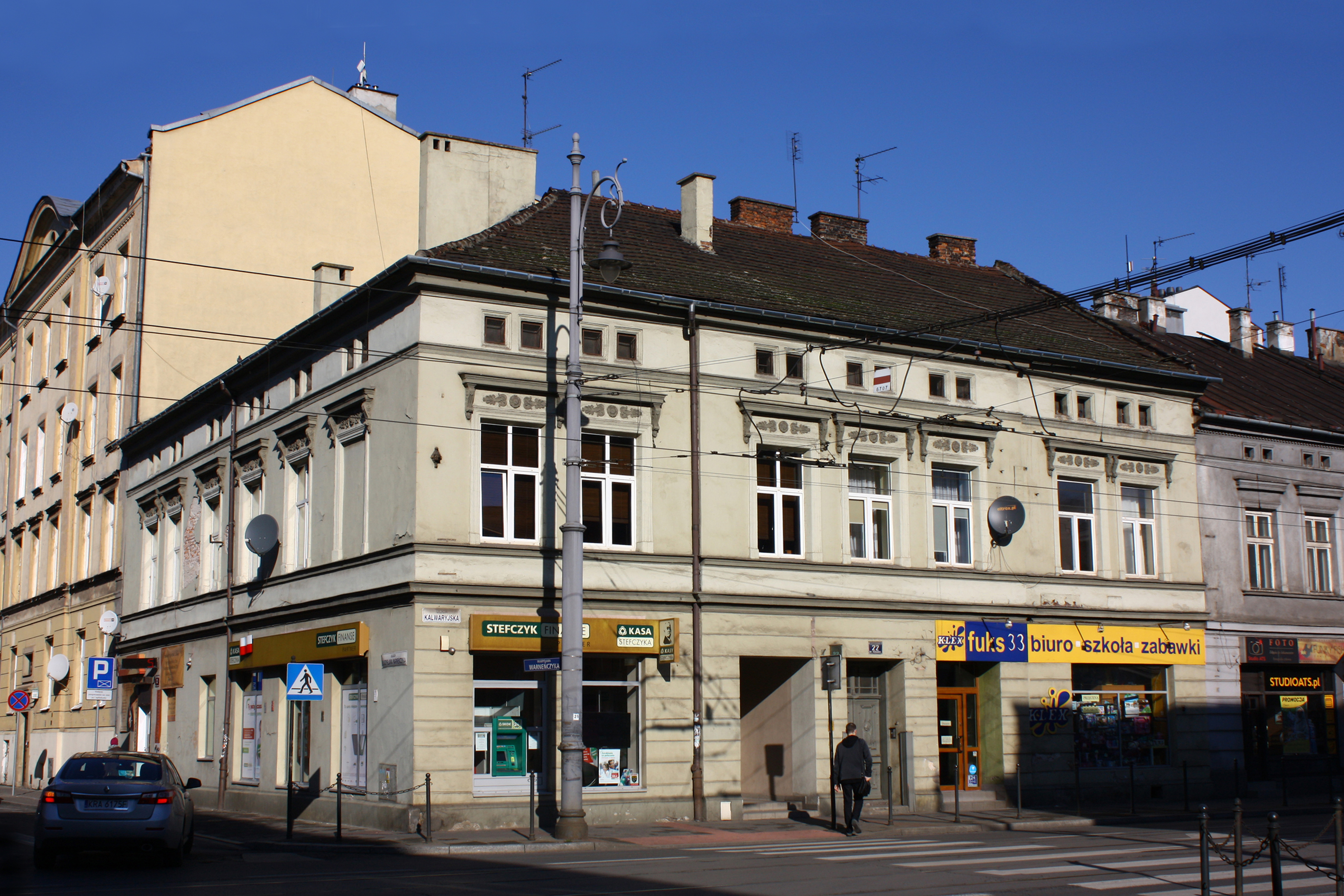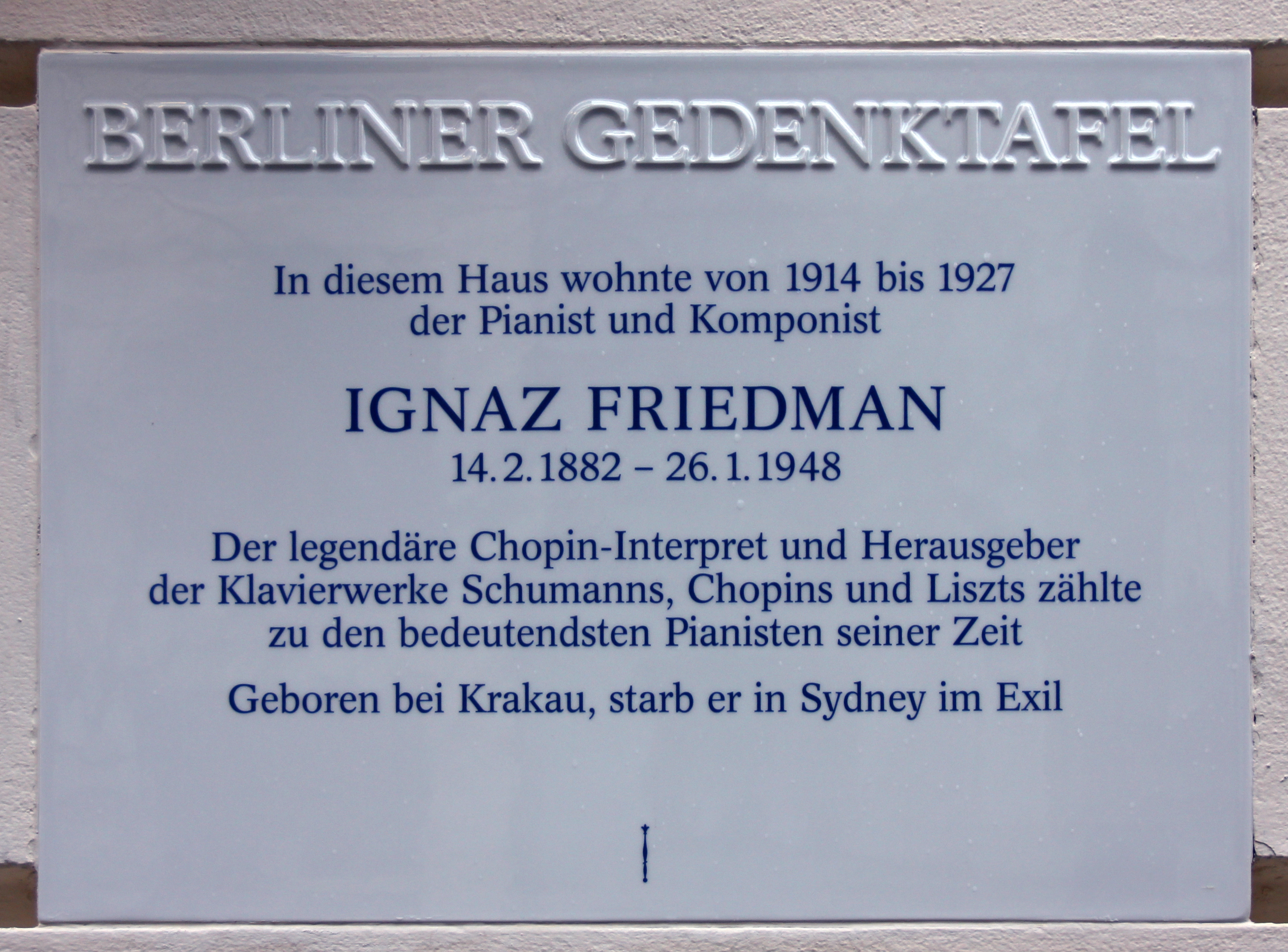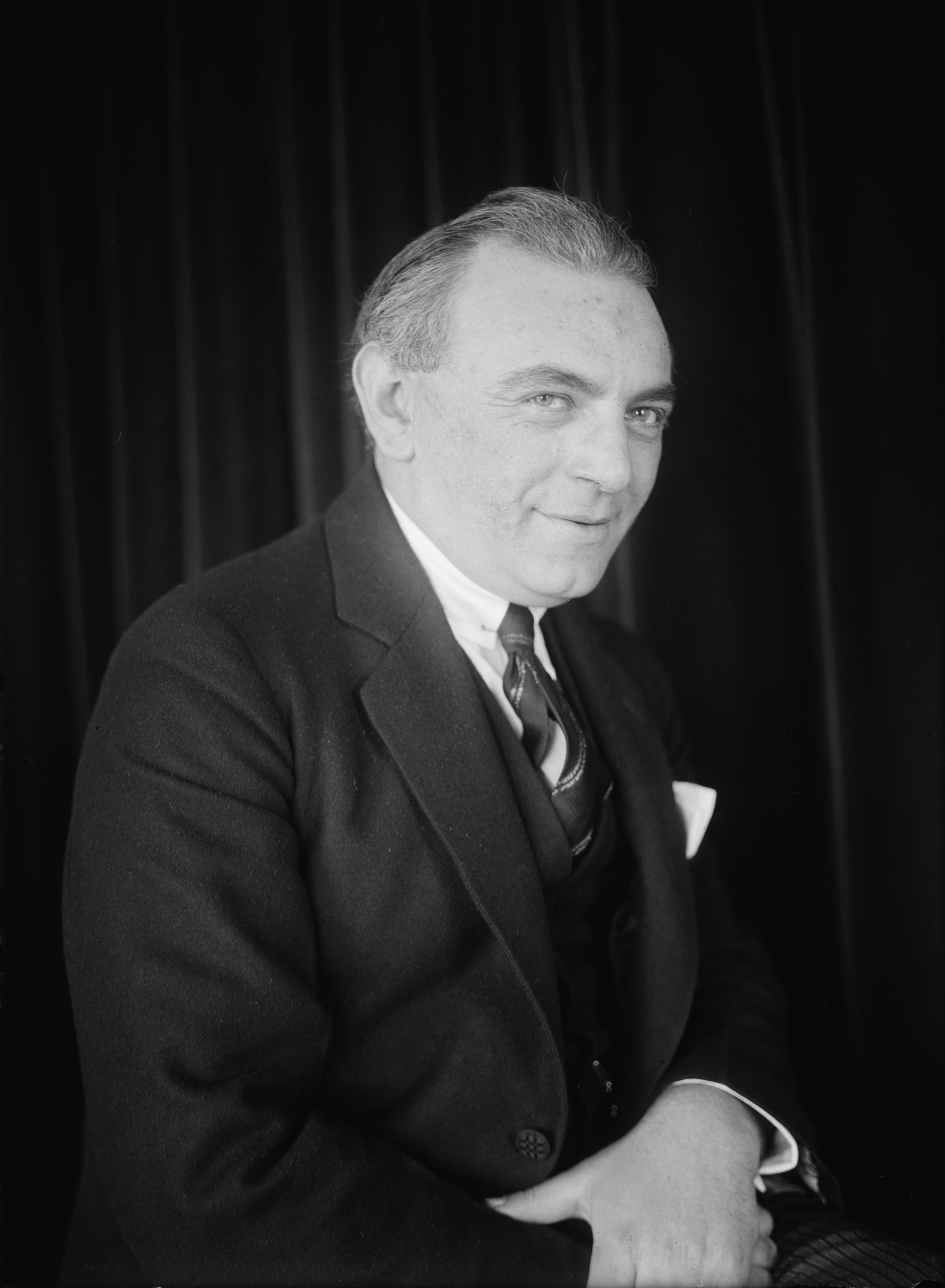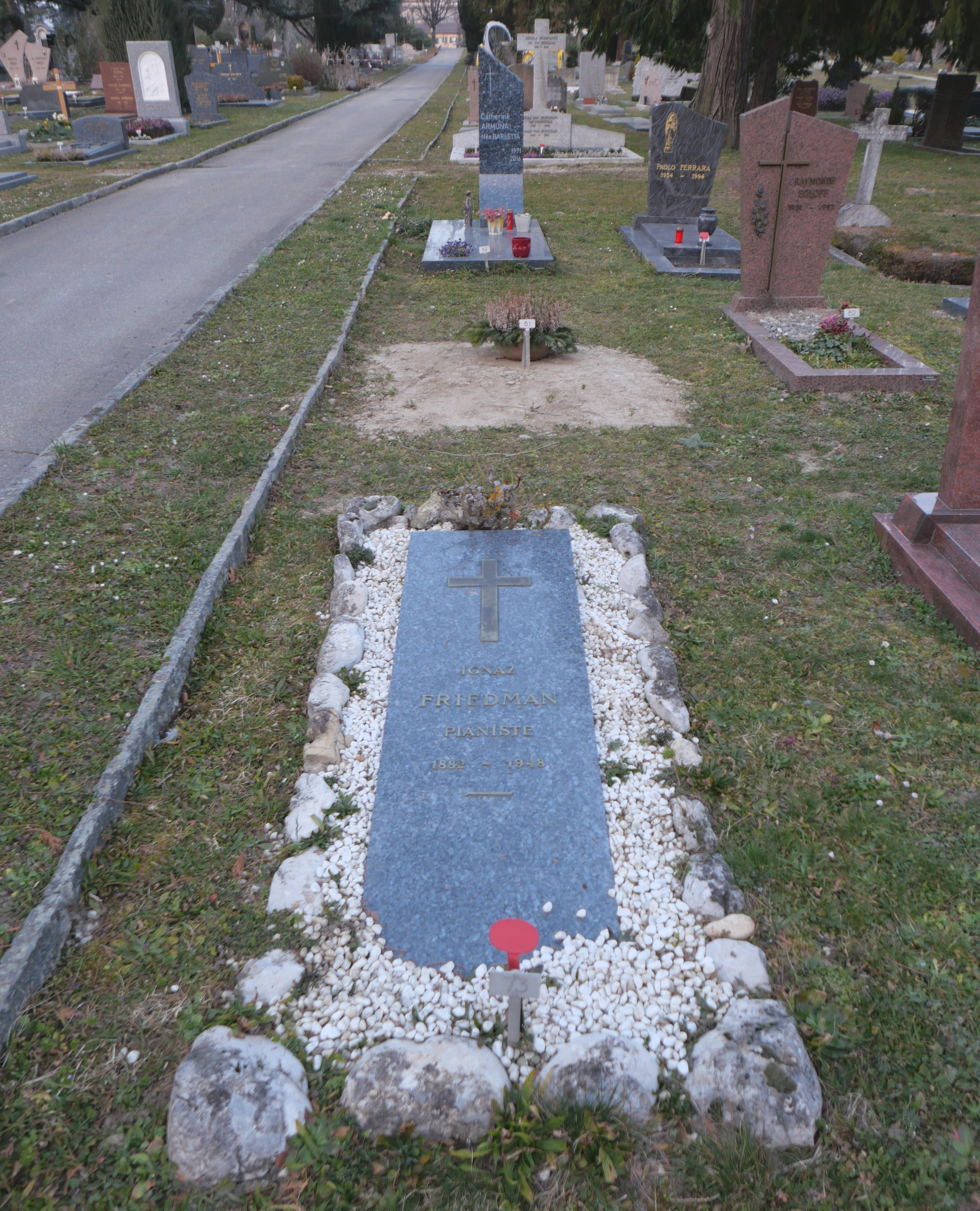1. Early Life and Education
Ignaz Friedman's early life was marked by his origins in a musical family and his rapid development as a child prodigy, leading to an extensive musical education under some of the most influential teachers of his time.
1.1. Birth and Family Background
Ignaz Friedman was born Salomon Izaak Freudmann on February 13, 1882, in Podgórze, a district near Kraków, Poland. His birthplace is specifically noted as existing at Kalwaryjska Street 22. He was born into a Jewish family, the son of Nachman Freudmann (sometimes referred to as Wolf or Wilhelm Freudmann), who was born in Monasterzyska, now in Ukraine, on July 10, 1857, and Salomea Eisenbach, born in Kraków on March 26, 1854. His father was an itinerant musician, suggesting a musical environment from his earliest days.

1.2. Childhood and Education
Friedman was recognized as a child prodigy early in his life. He began his piano studies in Kraków with Flora Grzywinska. His formal musical education continued with prominent figures in Europe; he studied with Hugo Riemann in Leipzig and with the renowned piano pedagogue Theodor Leschetizky in Vienna, where he also served as Leschetizky's assistant. Further refining his skills, Friedman participated in Ferruccio Busoni's master classes. Beyond his instrumental training, he also pursued academic studies, completing a degree in philosophy at Kraków University and studying composition and musicology to round out his comprehensive musical education.
2. Pianistic Career
Friedman's pianistic career was extensive and highly regarded, characterized by a distinctive style and acclaimed interpretations that solidified his place among the leading virtuosi of his generation.
2.1. Early Career and Debut
Ignaz Friedman made his official debut in Vienna in 1904. His debut program was notably ambitious, featuring three piano concertos, a choice that immediately placed him in direct competition with established titans of the piano like Ferruccio Busoni and Leopold Godowsky. This challenging debut set the stage for a career during which he consistently maintained his status as a formidable virtuoso. Following this successful debut, he embarked on a global career, quickly becoming a fixture on international concert stages. He resided in Berlin until 1914 and later settled in Copenhagen in 1920.

2.2. International Concert Tours
Friedman's career was marked by an astonishing number of performances. He gave over 2,800 concerts throughout his career, showcasing his artistry across the globe. His extensive touring schedule included numerous solo recitals and concerto appearances. He also frequently collaborated with other prominent musicians, notably performing duets with the renowned violinist Bronisław Huberman.
2.3. Performance Style and Interpretation
Friedman's performance style was renowned for its quiet and effortless execution, yet it was imbued with a profound sense of rhythm and color. His playing was grounded in a sovereign technique that allowed for immense expressive freedom. Critics and audiences alike widely praised his interpretations, particularly his peerless renditions of Chopin's works. Many considered his interpretations of Chopin's mazurkas to be unsurpassed, a sentiment shared with his compatriot and contemporary Moriz Rosenthal.

His technical prowess was as impressive as that of Rosenthal, Godowsky, and Josef Lhévinne. Friedman's playing was characterized by a rich variety of dynamics and agogics, which he employed without ever compromising musical balance. While his handling of texture, such as the doubling of bass lines, sometimes appeared old-fashioned, it contributed to a unique sound. His refined sense of rhythm and flexible structural command enabled him to elevate even small pieces, like Mendelssohn's Songs Without Words and Chopin's mazurkas, into truly great musical statements. A hallmark of his artistry was his devotion to the musical score and his ability to convey intricate details through an evolving rubato, emphasizing a tasteful transmission of music through his fingers rather than overt showmanship.
2.4. Reception and Contemporary Standing
Despite his prolific concert career and the admiration he garnered, Friedman sometimes received lukewarm reviews in America in his later years. This was largely due to younger critics becoming accustomed to a more modernist playing style that often stripped romantic interpretations of their agogics and essential character.
However, his standing among his peers remained exceptionally high. Sergei Rachmaninoff, for instance, greatly admired Friedman's playing and considered him a great virtuoso, noting that Friedman's style was more romantic than his own. While some anecdotal accounts, attributed to Rachmaninoff, suggested Friedman played "too much to the galleries," this claim has been widely disputed as originating from a questionable source and is considered untrue, especially given Friedman's emphasis on tasteful presentation over overt display. Friedman remained one of the last representatives of a bygone romantic era, even during Rachmaninoff's lifetime, at a time when recording technology began to prompt a different sensibility in performance. Despite some lost recordings, his position as a great master pianist of the 20th century remains unwavering.
3. World War II and Later Years
The outbreak of World War II dramatically altered the course of Friedman's life, forcing him to leave Europe and eventually leading to his retirement and death in Australia.
3.1. Escape and Australian Sojourn
At the onset of World War II, Ignaz Friedman was in Europe. However, he managed to escape the escalating conflict when a concert tour in Australia was offered at the last moment in 1940. He seized this opportunity and subsequently settled in Sydney, Australia. He remained in Sydney for the rest of his life, never returning to Europe.
3.2. Retirement and Death
Friedman's illustrious performing career came to an end on July 24, 1943, with his last concert in Sydney. Following this performance, he was forced to retire from the concert stage due to neuritis in his left hand, a physical ailment that made further public performances impossible. Ignaz Friedman passed away on January 26, 1948, which notably coincided with Australia Day. His grave is located at the cemetery of Petit-Saconnex in Geneva, Switzerland.

4. Compositions and Arrangements
Beyond his celebrated career as a concert pianist, Ignaz Friedman also made significant contributions as a composer of original works and as an editor and transcriber of the piano repertoire.
4.1. Compositions
Ignaz Friedman was a prolific composer, following the tradition of "composer-pianists." He composed over 90 works, primarily piano miniatures. His compositions also included pieces for cello and a piano quintet, as well as Passacaglia, Op. 44, and various etudes and piano concertos. While his works are considered superior to those of many other virtuoso-pianists of his time, they have not found a lasting place in the standard concert repertoire. Many of his piano miniatures, such as Tabatière à musique (Music Box), Op. 33, No. 3, are exquisite examples of salon music in the best sense. In 2022, his complete vocal output, comprising 37 songs, was issued as a recording.
4.2. Arrangements and Editions
Friedman's contributions extended to arranging and editing the works of other composers. He created numerous transcriptions, notably of pieces by Johann Sebastian Bach and Domenico Scarlatti. Furthermore, he undertook extensive editorial work, producing an almost complete edition of Chopin's piano works for Breitkopf & Härtel. He also edited and published works by Robert Schumann and Franz Liszt.
5. Legacy and Influence
Ignaz Friedman's legacy endures through his admired recordings, his impact as a teacher, and the continued recognition of his artistic contributions.
5.1. Recordings and Artistic Legacy
Despite the relatively small number of recordings he made, Ignaz Friedman's recorded output is widely admired by musicians and critics. His recordings, particularly those of Chopin's works and Mendelssohn's nine Songs Without Words, are highly regarded for preserving his unique musical heritage. Like many great artists of his time who broadcast their performances, a significant portion of Friedman's recorded material has been lost, including hours of radio recordings made during his time in Australia and New Zealand. Nevertheless, the existing recordings firmly establish his position as one of the great master pianists of the 20th century.
5.2. Teaching and Honors
Friedman was also an influential teacher who mentored several important pianists. Among his notable students were Joseph Gurt, Karol Klein, Anna Schytte, Ignace Tiegerman, and Bruce Hungerford. His impact on music education is further recognized by the Sydney Conservatorium of Music, which awards an annual Ignaz Friedman Prize for composition, honoring his dual role as a performer and composer.
6. Discography
6.1. Releases by Naxos Historical
- Vol.1: BEETHOVEN: 'Moonlight' Sonata / CHOPIN: Mazurkas (8.110684)
- Vol.2: GRIEG: Piano Concerto / CHOPIN: Sonata in B Flat Minor (8.110686)
- Vol.3: CHOPIN: Mazurkas (8.110690)
- Vol.4: MENDELSSOHN: Songs without Words (8.110736)
- Vol.5: English Columbia Recordings (8.111114)
6.2. Release by Arbiter
- Masters of Chopin (Arbiter 158): Selection including previously unpublished recordings.
6.3. As Composer
- Ignaz Friedman: Piano Works - Michael Schafer (Genuin Classics, 89149) (2009)
- Friedman: Original Piano Compositions - Joseph Banowetz (Grand Piano GP711) (2016)
- Complete Songs - Şen Acar (soprano), Szymon Chojnacki (bass-baritone), Jakub Tchorzewski (piano) Acte Préalable AP0523 (2022)
7. Further Reading
- Allan Evans. Ignaz Friedman: Romantic Master Pianist. Bloomington, Indiana University Press, 2009.
8. External links
- [https://imslp.org/wiki/Category:Friedman,_Ignaz Ignaz Friedman on IMSLP]
- [http://www.arbiterrecords.com/musicresourcecenter/friedtch.html At the Piano with Ignaz Friedman]
- [http://www.arbiterrecords.com/musicresourcecenter/friedman.html Friedman's concert programs]
- [http://www.bosendorferimperial.com BosendorferImperial.com] - site about the Imperial piano with complete audio files including "Viennese Waltz, #2" from a set of six waltzes written by Friedman, played by Victor Borge
- [https://polona.pl/search/?query=Ignacy_Friedman&filters=creator:%22Friedman,_Ignacy_(1882--1948)%22,creator:%22Friedman,_Ignacy_(1882--1948)_Kompozytor%22,public:1,hasTextContent:0 Scores by Ignaz Friedman] in digital library Polona